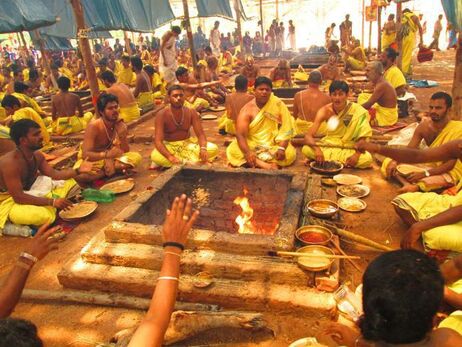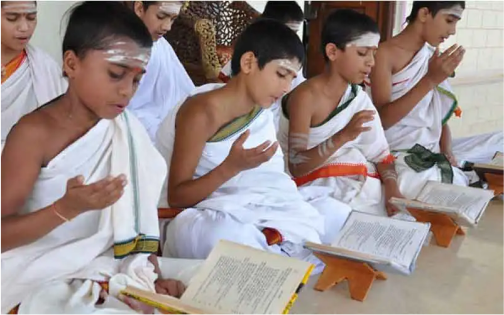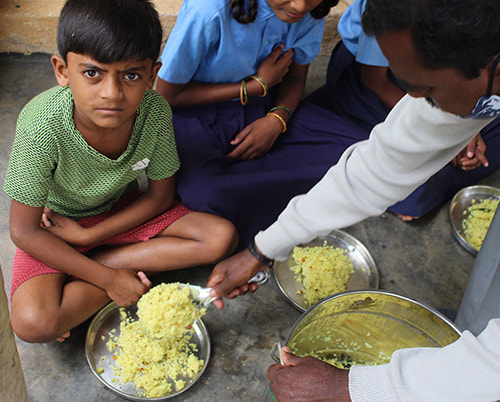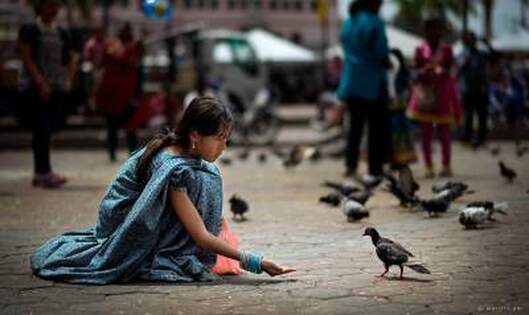|
There is a concept of Pancha Maha Yajna, five great sacrifices. These are a constant duty for all living people. These are based upon certain Rina (debts) we have to various beings in life. Our lives are not independent. We are reliant on various beings in order to live prosperous lives. Based upon what we take from others, we assume certain debts, which are paid off through the practice of the Pancha Maha Yajnas. The five debts are 1) Pitri Rinam (debt to the ancestors), 2) Deva Rinam (debt to the Gods), 3) Rishi Rinam (debt to the Sages, Gurus and Preceptors), 4) Manushya Rinam (debt to society), and Bhuta Rinam (debt to living beings spiritual beings, nature, the elements and the environment). Pitri Rinam (debt to the ancestors) and Pitri YajnaPitri Rinam (debt to the ancestors) We owe this live to our mother and father and ancestors. Without them, we could not be living in the world. We take on a lot of karma from the ancestors which is referred to in the West as genetic inheritance. Traditional Practice: Pitri Yajnam - To become free from this debt to our ancestors, traditionally we maintain good relations, supporting our living relatives, and we offer daily pitri tarpanam and monthly pitri tarpanam at home in addition to annual shraaddha and pinda danam and and anyeshti (funerals) for departed ancestors for which priests are hired to perform the complex rituals. Modern Approach: We can make a daily offering of a brass kumbha of water and a brass bowl of til (black sesame) seeds for our ancestors with any mantras we know offered for the welfare of our ancestors. Annually we can hire priests to perform shraadha and pinda danam or tila homam for our departed ancestors. We can remain in contact with living relatives and help them as we are able, and help ensure that proper funeral rituals are performed whenever a relative passes. Deva Rinam (debt to the Gods) and Deva Yajna Deva Rinam (debt to the Gods) There are many spiritual beings (Devas) whose role it is in creation to assist humanity from the inner realms. Much protection and support comes from the Devas. We have a duty to make certain offerings to the Devas to help facilitate their work. Traditional Practice: Deva Yajnam - This offering was traditionally fulfilled by the performance of daily yajnas (fire sacrifices) like aupasanam and agnihotra, and monthly and annual yajnas like darshapurnamasa, chaturmasya and nirudhapashabandha. These rituals required initiation into the Vedas and a vast amount of knowledge to perform. Modern Approach: In modern times, it is not practical to accomplish the vastly complex Vedic yajnas. The modern Sages of the Puranas and Tantras have recommended simplified puja offerings. We can perform daily puja of 16 upacharas at home and visit the Temple of our kuladevatas and ishtadevas once a week. Annually we can perform tirtha yatra (pilgrimage) to one distant sacred Temple. We should save money and donate to the Temples we visit according to our ability to help support these sacred sites through which the Devas work on Earth. Rishi Rinam (debt to the Sages, Gurus and Preceptors) and Brahma YajnaRishi Rinam (debt to the Sages, Gurus and Preceptors) We have a debt also to the Sages, Gurus and spiritual Perceptors. In ancient times, the Sages were given much respect and society has based itself around the suggestions of the enlightened masters in many ways which benefit the world immensely. Without the enlightened guidance from the Sages, it would be very difficult for us to enjoy lasting pleasure in life or to come to spiritual awareness. Traditionally, this debt is paid by Vedic Study. This means Vedic recitation. Study in this sense is not an intellectual process of reading and thinking about the Vedas, but reciting the Vedas so that the sacred vibration of the hymns can uplifted us to the same enlightened state as the Sage who revealed that hymn. Traditional Practice: Brahma Yajnam - traditionally, this yajnam is fulfilled through the practice of Brahma Yajna, a ritual performed by those who have been initiated into the Vedas after the midday Madhyahnikam practice. In the Brahma Yajna ritual, the first verse of each Veda is recited along with various hymns from the Veda a person has been initiated into. Modern Approach: Listening to the pravachanam (discourses) of the living masters. By practicing the mantras, kriyas, or meditations we have been taught and initiated into by our master. Those who are initiated to recite Vedas can recite what Vedas they know. Those who are not initiated into Vedas can attend a Temple where Vedas are recited or listen to audio recordings of purohits reciting Vedas. We can donate to the acharyas, gurus, and other teachers who help spread spiritual knowledge, especially on Guru Purnima day around July. Manushya Rinam (Debt to Society) and Atithi YajnaManushya Rinam (Debt to Society) We have a debt to humanity and society. We can not live without the efforts of many people. The people who grew the vegetables we eat. The people who made the materials from which our homes are constructed. The architect who designed and the builders who built our home. The government officials who approved the building plans to ensure our homes are safe for inhabitation. etc. Traditional Practice: Atithi Yajnam - This debt to society was traditionally paid by householders by offering hospitality to travelers, students, and sadhus. If any hungry person was seen in the vicinity of the house, it was seen as a householder's duty to feed that person. Modern Approach: We can offer food or money to needy people whenever we encounter them. We can donate time and money to various charities which help the underprivileged. Bhuta Rinam (debt to living beings spiritual beings,, nature, the elements and the environment) and Bhuta YajnamBhuta Rinam (debt to living beings spiritual beings,, nature, the elements and the environment) We have a debt to all sorts of beings including various spiritual beings, animals and plants without whom we could not survive. We owe a great debt to nature itself and
Traditional Practice: Bhuta Yajna involved making daily bali offers which serve to satiate spiritual beings in the place we live and hungry animals. We strive to live in accordance with nature causing as little harm as possible to the environment and especially to living beings around us. Modern Practice: We can strive to protect the environment by creating less waste and using sustainable forms of energy and clothing and vehicles and building materials. We can reduce harm to animals and to the environment a great deal by adopting a vegetarian diet. Where laws allow, we can make regular offerings of food for animals and spiritual beings. We can donate time and money to charities that help animals and the environment. In many Western countries there are laws prohibiting feeding wild animals. It may be wise to check with local authorities about laws pertaining to this. In most localities it should be at least legal to offer suitable food to birds. Even where laws prohibit feeding animals, it should be possible to appease spiritual beings by pouring offerings of water or milk into the ground for this purpose.
0 Comments
|
Soma Matha BlogSharing news, articles, teachings, and events. Archives
September 2023
Categories |





 RSS Feed
RSS Feed